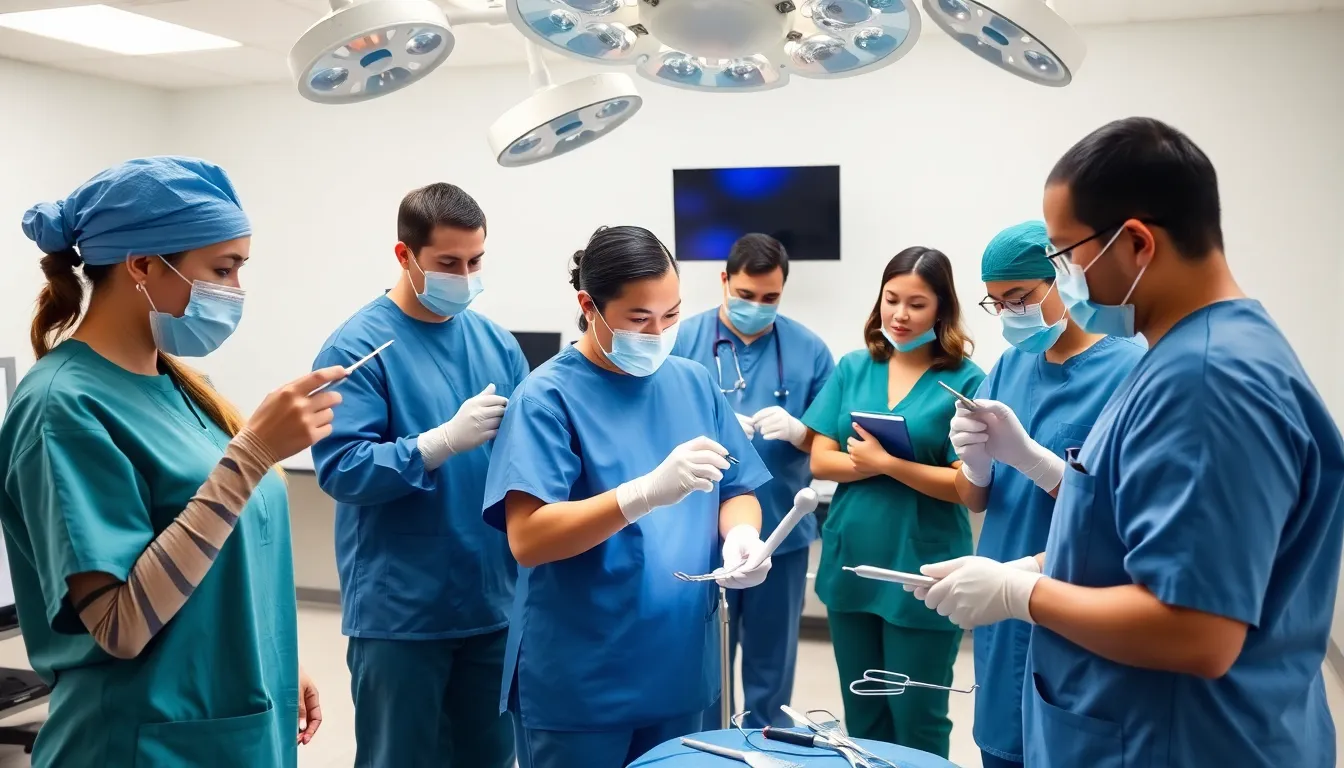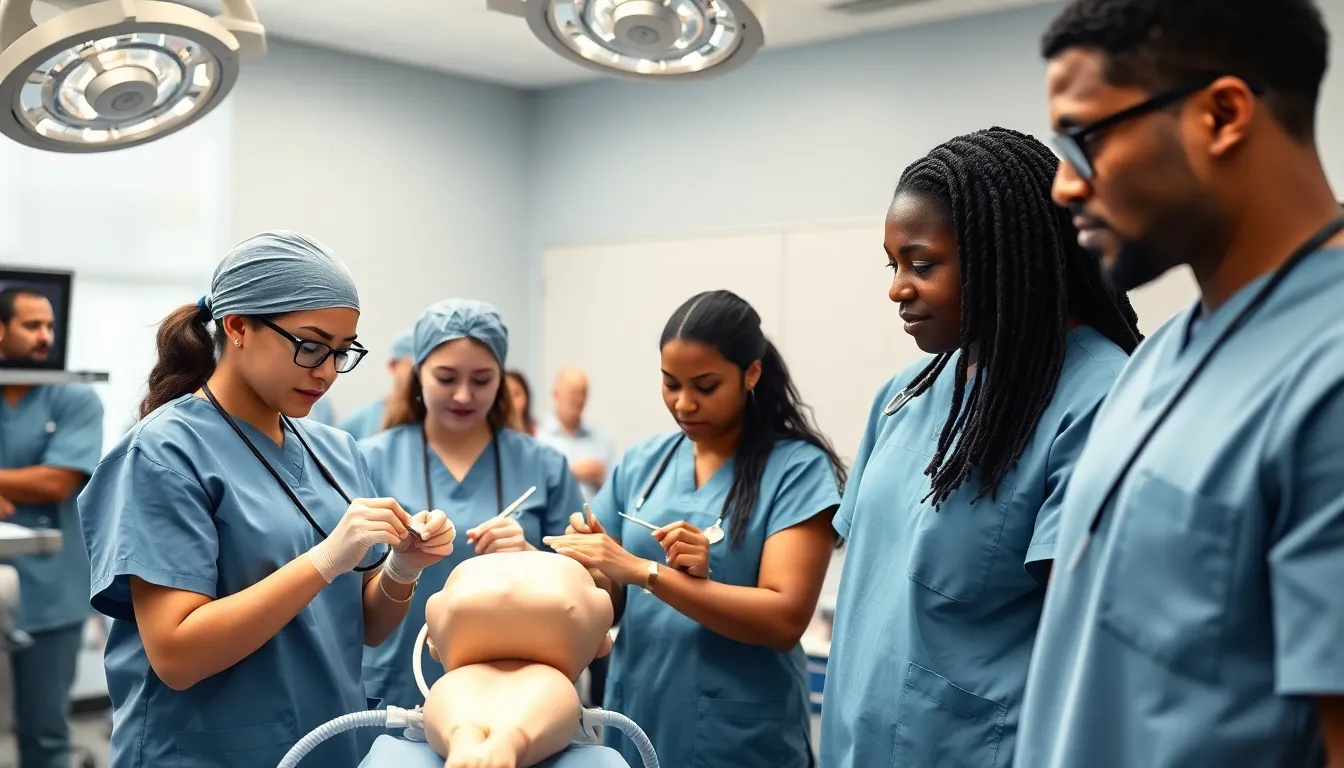In the fast-paced world of healthcare, surgical techs are the unsung heroes, ready to jump into action with the precision of a ninja and the heart of a lion. These skilled professionals are the backbone of the operating room, ensuring everything runs smoothly while wielding instruments like a pro. But before they can don those scrubs and step into the spotlight, they need the right training.
Table of Contents
ToggleOverview of Surgical Tech Training Programs
Surgical tech training programs prepare individuals for dynamic roles in the operating room. Programs typically include a combination of classroom instruction and hands-on clinical experiences. The curriculums cover essential topics such as anatomy, surgical procedures, sterile techniques, and patient care.
Many accredited programs last between 9 months and 24 months, leading to certificates, diplomas, or associate degrees. Instructors often include experienced surgical professionals, ensuring students gain practical insights. Students participate in simulations and real-life scenarios to enhance their skills and confidence.
Certification is a crucial aspect of career advancement in surgical technology. The National Board of Surgical Technology and Surgical Assisting (NBSTSA) administers certification exams. Completing an accredited program and passing this exam allows surgical techs to earn the Certified Surgical Technologist (CST) designation.
Job prospects for surgical techs remain positive, with the Bureau of Labor Statistics projecting a 7% growth from 2019 to 2029. This demand often results in competitive job markets, emphasizing the importance of quality training and certification.
Networking and internships during training programs also prove beneficial. These experiences often lead to job offers or valuable professional contacts within healthcare settings. Connecting with established professionals in the field can enhance a graduate’s career opportunities.
Overall, surgical tech training programs play a pivotal role in shaping competent healthcare professionals. Through rigorous training and practical applications, graduates emerge ready to support surgical teams effectively.
Types of Training Programs

Surgical tech training programs come in various formats, catering to different career goals and timelines. Each type offers unique benefits, ensuring aspiring surgical technicians can find a suitable path for their education.
Certificate Programs
Certificate programs provide a quick route to becoming a surgical technologist. Typically lasting 9 to 12 months, these programs focus on essential skills like sterile techniques, anatomy, and surgical procedures. Many institutions offer these certifications, which often include practical, hands-on experience through clinical rotations. Graduates can obtain immediate entry-level positions within the healthcare field, making this an appealing option for those wanting to enter the workforce quickly.
Associate Degree Programs
Associate degree programs usually span 15 to 24 months and encompass a broader curriculum. They integrate general education courses with surgical technology coursework, enhancing critical thinking and communication skills. Many community colleges and technical schools provide associate degree programs, which often include supervised clinical experiences. Graduates not only earn a degree but also qualify to sit for the Certified Surgical Technologist exam, significantly improving their job prospects.
Bachelor’s Degree Programs
Bachelor’s degree programs extend training over four years and offer comprehensive education in surgical technology along with advanced healthcare topics. Students engage with in-depth studies of surgical procedures, patient management, and healthcare systems. Institutions offering these degrees emphasize leadership, preparing graduates for potential supervisory roles within surgical teams. Completing a bachelor’s program enhances career opportunities and salary potential, reflecting the investment in a more extensive educational foundation.
Curriculum Aspects
Surgical tech training programs incorporate a diverse curriculum to equip students with essential skills for the operating room. These programs blend theoretical knowledge with practical application.
Core Subjects
Core subjects in surgical tech training focus on key areas vital to surgical practice. Anatomy and physiology provide a solid foundation for understanding the human body. Students learn surgical procedures that cover a variety of techniques and approaches. Sterile processing and infection control are taught to ensure safety and cleanliness. Patient care is essential, including preoperative and postoperative procedures. Additionally, medical terminology is crucial for effective communication within healthcare teams. Overall, these subjects create a comprehensive learning experience.
Hands-On Training
Hands-on training forms a critical element of surgical tech education. Students participate in clinical rotations, which offer real-world experience in surgical settings. Operating room simulations enhance learning through practice in a controlled environment. During these training exercises, students apply techniques learned in the classroom to actual scenarios. Opportunities to assist with surgeries under professional supervision promote confidence and skill development. Every training program emphasizes proficiency in surgical instruments and equipment handling, ensuring graduates are well-prepared for their roles.
Accreditation and Certification
Accreditation and certification play pivotal roles in surgical tech training programs. Recognized programs often receive accreditation from the Commission on Accreditation of Allied Health Education Programs (CAAHEP) or the Accreditation Review Council on Education in Surgical Technology and Surgical Assisting (ARC/STSA). These accreditations ensure that programs meet rigorous educational standards and provide quality training.
Certification enhances job prospects significantly. Graduates can pursue the Certified Surgical Technologist (CST) designation through the National Board of Surgical Technology and Surgical Assisting (NBSTSA). This certification validates the skills and knowledge acquired during training, making candidates more competitive in the job market.
Maintaining certification requires ongoing education and renewal every four years. Methods include continuing education credits through workshops, seminars, or online courses. Participation in these educational opportunities not only keeps skills current but demonstrates a commitment to professional development.
Employers often prefer candidates with accredited training and certification. Many hospitals and surgical centers prioritize hiring surgical techs who possess the CST designation, reflecting their training’s quality and their preparedness for the operating room. Potential employers recognize that accredited programs ensure graduates undergo rigorous training, covering vital subjects like patient care and sterile techniques.
Networking during training also influences certification success. Connections with instructors and industry professionals can lead to valuable guidance, mentorship, and job opportunities. Engaging in internships or clinical rotations further solidifies this network, providing a solid foundation for a surgical tech’s career.
Understanding the significance of accreditation and certification helps individuals make informed decisions about their training programs. Choosing accredited programs and pursuing relevant certifications can significantly enhance career trajectories for aspiring surgical technologists.
Job Opportunities After Training
Surgical tech training opens numerous job opportunities in the healthcare sector. Graduates typically find roles in hospitals, outpatient surgical centers, and specialized clinics. These settings value the skills acquired through both theoretical and hands-on training.
Positions often include surgical technologist, surgical first assistant, and sterile processing technician. Surgical technologists assist during operations, ensuring the appropriate instruments are ready, while first assistants may take on additional responsibilities. Sterile processing technicians focus on cleaning, sterilizing, and preparing surgical instruments, highlighting the diverse pathways within this field.
Entry-level positions often require graduation from an accredited program and passing the Certified Surgical Technologist exam. Organizations such as the National Board of Surgical Technology and Surgical Assisting validate skills, enhancing job prospects. Employers frequently favor candidates with a CST designation, recognizing their commitment to maintaining high standards in surgical care.
The job market remains promising, with a projected 7% growth rate for surgical tech positions from 2019 to 2029. Demand for qualified surgical techs increases due to advancements in surgical procedures and technologies. Many medical facilities seek individuals capable of adapting to new technologies and methods.
Career advancement also remains viable. Additional education or experience can pave the way for roles in supervisory or specialized surgical tech positions. Networking and internship opportunities during training can greatly enhance job search outcomes.
Continuing education plays a crucial role in staying competitive. Surgical techs must engage in ongoing training and workshops to maintain certification. This dedication not only opens further opportunities but also fosters professional growth in an evolving field.
Surgical tech training programs play a vital role in shaping skilled professionals who support surgical teams. With diverse options available from certificate to bachelor’s degree programs, aspiring surgical technologists can choose paths that align with their career goals.
Accreditation and certification are crucial for ensuring quality education and enhancing job prospects. Graduates equipped with the Certified Surgical Technologist designation are well-prepared to enter a growing job market, where opportunities abound in various healthcare settings.
By investing in quality training and actively engaging in networking, individuals can build a solid foundation for a successful career in surgical technology. The future looks bright for those ready to embrace the challenges and rewards of this essential field.




